Related Research Articles
Human occupation of Rwanda is thought to have begun shortly after the last ice age. By the 11th century, the inhabitants had organized into a number of kingdoms. In the 19th century, Mwami (king) Rwabugiri of the Kingdom of Rwanda conducted a decades-long process of military conquest and administrative consolidation that resulted in the kingdom coming to control most of what is now Rwanda. The colonial powers, Germany and Belgium, allied with the Rwandan court.

The Rwandan Patriotic Front, is the ruling political party in Rwanda.

The Interahamwe is a Hutu paramilitary organization active in the Democratic Republic of the Congo and Uganda. The Interahamwe was formed around 1990 as the youth wing of the National Republican Movement for Democracy and Development, the then-ruling party of Rwanda, and enjoyed the backing of the Hutu Power government. The Interahamwe, led by Robert Kajuga, were the main perpetrators of the Rwandan genocide, during which an estimated 500,000 to 1,000,000 Tutsi, Twa, and moderate Hutus were killed from April to July 1994, and the term "Interahamwe" was widened to mean any civilian militias or bands killing Tutsi.

The Rwandan genocide, also known as the genocide against the Tutsi, occurred between 7 April and 19 July 1994 during the Rwandan Civil War. During this period of around 100 days, members of the Tutsi minority ethnic group, as well as some moderate Hutu and Twa, were killed by armed Hutu militias. Although the Constitution of Rwanda states that more than 1 million people perished in the genocide, the actual number of fatalities is unclear, and some estimates suggest that the real number killed was likely lower. The most widely accepted scholarly estimates are around 500,000 to 800,000 Tutsi deaths.

Radio Télévision Libre des Mille Collines (RTLM) was a Rwandan radio station which broadcast from July 8, 1993, to July 31, 1994. It played a significant role in inciting the Rwandan genocide that took place from April to July 1994, and has been described by some scholars as having been a de facto arm of the Hutu government.

The assassination of presidents Juvénal Habyarimana and Cyprien Ntaryamira in the evening of April 6, 1994 was the proximate trigger for the Rwandan genocide, which resulted in the murder of approximately 800,000 Tutsi and a smaller number of moderate Hutu. The first few days following the assassinations included a number of key events that shaped the subsequent course of the genocide. These included: the seizing of power by an interim government directed by the hard-line Akazu clique; the liquidation of opposition Hutu politicians; the implementation of plans to carry out a genocide throughout the country; and the murder of United Nations peacekeepers, contributing to the impulse of the international community to refrain from intervention.
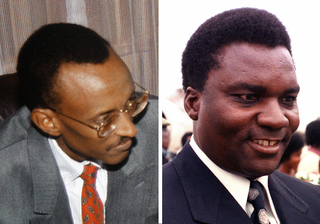
The Rwandan Civil War was a large-scale civil war in Rwanda which was fought between the Rwandan Armed Forces, representing the country's government, and the rebel Rwandan Patriotic Front (RPF) from 1 October 1990 to 18 July 1994. The war arose from the long-running dispute between the Hutu and Tutsi groups within the Rwandan population. A 1959–1962 revolution had replaced the Tutsi monarchy with a Hutu-led republic, forcing more than 336,000 Tutsi to seek refuge in neighbouring countries. A group of these refugees in Uganda founded the RPF which, under the leadership of Fred Rwigyema and Paul Kagame, became a battle-ready army by the late 1980s.
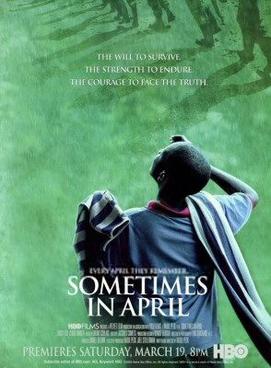
Sometimes in April is a 2005 American made-for-television historical drama film about the 1994 Rwandan Genocide, written and directed by the Haitian filmmaker Raoul Peck. The ensemble cast includes Idris Elba, Oris Erhuero, Carole Karemera, and Debra Winger.
Simon Bikindi was a Rwandan singer-songwriter who was formerly very popular in Rwanda. His patriotic songs were playlist staples on the national radio station Radio Rwanda during the war from October 1990 to July 1994 before the Rwandan Patriotic Front took power. For actions during the April 1994 genocide against Tutsi, he was tried and convicted for incitement to genocide by the International Criminal Tribunal for Rwanda (ICTR) in 2008. He died of diabetes at a Beninese hospital in late 2018.
Georges Henri Yvon Joseph Ruggiu is a Belgian radio presenter who worked for Rwandan radio station Radio Télévision Libre des Mille Collines, which played a significant role in promoting the genocide against the Tutsi. Like the station's other broadcasters, Ruggiu incited violence against Tutsi and moderate Hutu over the air. He had become involved in Rwandan politics just two years before the genocide.
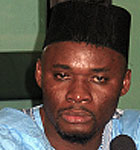
Hassan Ngeze is a Rwandan journalist and convicted war criminal best known for spreading anti-Tutsi propaganda and Hutu superiority through his newspaper, Kangura, which he founded in 1990. Ngeze was a founding member and leadership figure in the Coalition for the Defence of the Republic (CDR), a Rwandan Hutu Power political party that is known for helping to incite the genocide.
Radio Rwanda is a radio station of the Rwandan Broadcasting Agency (RBA), a public broadcaster that also owns Rwandan Television, RTV for short, Magic FM and other public radio stations.

Kangura was a Kinyarwanda and French-language magazine in Rwanda that served to stoke ethnic hatred in the run-up to the Rwandan genocide. The magazine was established in 1990, following the invasion of the rebel Rwandan Patriotic Front (RPF), and continued publishing up to the genocide. Edited by Hassan Ngeze, the magazine was a response to the RPF-sponsored Kanguka, adopting a similar informal style. "Kangura" was a Rwandan word meaning "wake others up", as opposed to "Kanguka", which meant "wake up". The journal was based in Gisenyi.
Ferdinand Nahimana is a Rwandan historian, who was convicted of incitement to genocide for his role in the Rwandan genocide.
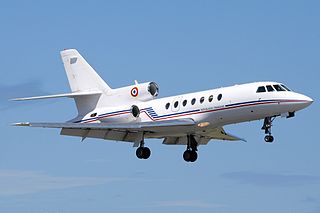
On the evening of 6 April 1994, the aircraft carrying Rwandan president Juvénal Habyarimana and Burundian president Cyprien Ntaryamira, both Hutu, was shot down with surface-to-air missiles as their jet prepared to land in Kigali, Rwanda; both were killed. The assassination set in motion the Rwandan genocide, one of the bloodiest events of the late 20th century.
Hutu Power is racial supremacist ideology that asserts the ethnic superiority of Hutu, often in the context of being superior to Tutsi and Twa, and that therefore they are entitled to dominate and murder these two groups and other minorities. Espoused by Hutu extremists, widespread support for the ideology led to the 1994 Rwandan genocide against Tutsi and their family members, the moderate Hutu who opposed the killings, and Twa who were deemed traitors. Hutu Power political parties and movements included the Akazu, the Coalition for the Defence of the Republic and its Impuzamugambi paramilitary militia, and the governing National Republican Movement for Democracy and Development and its Interahamwe paramilitary militia. The theory of Hutu people being superior is most common in Rwanda and Burundi, where they make up the majority of the population. Due to its sheer destructiveness, the ideology has been compared to historical Nazism in the Western world.
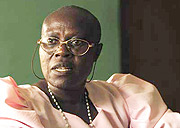
Valérie Bemeriki is a Rwandan convicted war criminal and radio entertainer. Bemeriki was one of the main animatrices of Radio Télévision Libre des Mille Collines (RTLM), which played a significant role in promoting the genocide against the Tutsi.

Kantano Habimana, commonly referred to as Kantano, was a presenter (animateur) on the Rwandan radio station RTLM, which played a significant role in promoting the genocide against the Tutsi. Like the station's other broadcasters, Habimana incited violence against Tutsi and moderate Hutu on the air.
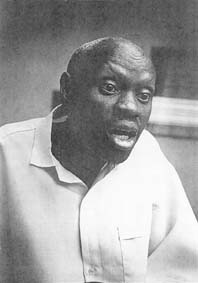
Noël (Noheli) Hitimana was a presenter (animateur) on the Rwandan radio station Radio Télévision Libre des Mille Collines (RTLM), which played a significant role in promoting the genocide against the Tutsi. Like the station's other broadcasters, Hitimana incited violence against the Tutsi on the air.
The double genocide theory posits that, during the Rwandan genocide, the Tutsi-led Rwandan Patriotic Front (RPF) engaged in a "counter-genocide" against the Hutus. Most scholars of Rwanda, such as Scott Straus and Gerald Caplan, say that RPF violence against Hutus does not fully match the definition of "genocide", considering that it instead consisted of war crimes or crimes against humanity.
References
- ↑ "Broadcasting Genocide: Censorship, Propaganda and State-Sponsored Violence in Rwanda, 1990–1994" (PDF). Article 19, London, UK. 1996. Archived from the original (PDF) on 2008-05-13. Retrieved 2007-06-07.
- ↑ "Radio Muhabura 0030, 30 Jan 1993". BBC Summary of World Broadcasts, 2 Feb 1993. 1993-01-30. Archived from the original on 24 January 2010. Retrieved 7 June 2007.
- ↑ "Radio Muhabura 1715, 11 Feb 1993". BBC Summary of World Broadcasts, 13 Feb 1993. 1993-02-11. Archived from the original on 24 January 2010. Retrieved 7 June 2007.
- ↑ "Hate Media in Rwanda > Question Period". Carleton University School of Journalism and Communication). 2004-03-13. Retrieved 2007-06-05.
- ↑ "Echoes of violence: considerations on radio and genocide in Rwanda". Journal of Genocide Research 6 (1)). March 2004. Retrieved 2007-06-05.